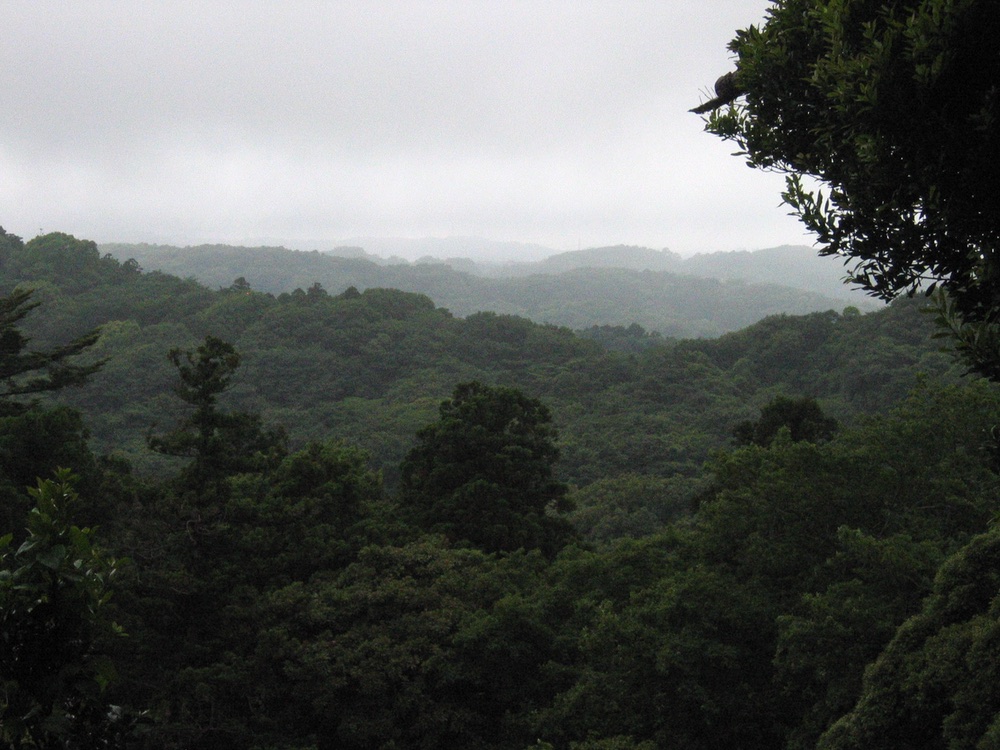I have had the privilege of standing—not in the exact cedars and mountains you’ll discover below—but nonetheless in cedars, in mountains, in northern Japan. It wasn’t a pilgrimage. But it sort of was. It was a long train ride. A very long walk. A very nearly exhausting long ascent. No guide. Just a curiosity. Just two of us. At the top… I realized that the journey—if we had wanted to continue—had only _just_begun. Choices about time and commitments to others were made.
As a faint mist settles in among the towering cedar trees (some more than 1,000 years old), our funeral procession slowly ascends Mt Haguro’s stone stairway. It’s summer, but the air here is still cool. When the poet Matsuo Bashō made a similar journey through these holy mountains in 1689, he wrote a haiku describing the summer wind being ‘scented’ with the clearly visible snow of Mt Gassan in the distance. Today, it smells of pine needles and earth.
~ Tim Bunting from, https://psyche.co/ideas/more-radical-and-practical-than-stoicism-discover-shugendo
Is mine a story I’ve shared, or a suggestion?
Reading
He that loves reading has everything within his reach.
Not me, I’m certain
Three words matter much: Not me, I’m certain I am uncertain. I’m not simply _un_certain. Not simply indecisive, beset by unknowns, nor stymied by possibilities.
The virtue of intellectual humility is getting a lot of attention. It’s heralded as a part of wisdom, an aid to self-improvement and a catalyst for more productive political dialogue. While researchers define intellectual humility in various ways, the core of the idea is “recognizing that one’s beliefs and opinions might be incorrect.”
But achieving intellectual humility is hard. Overconfidence is a persistent problem, faced by many, and does not appear to be improved by education or expertise. Even scientific pioneers can sometimes lack this valuable trait.
~ Michael Dickson from, https://theconversation.com/intellectual-humility-is-a-key-ingredient-for-scientific-progress-211410
The compass for me is, “so what?” When I’m certain of something, I ask myself: So, what? Connecting that which I’m certain of, out into the world via, “so, what?” challenges me to look at the underpinnings of my beliefs, and the integration with my knowledge in total.
Enlightened
If you think you’re enlightened go spend a week with your family.
~ Ram Dass
Always be starting
Am I too often seeking the sense of safety or control? (And it is indeed only a sense-of. It is only an illusion.) What happened to the simple feeling of joy in being?
What this means, as I understand it, is that when we let go of all attachment to the outcome of our novel publication/album release/opening of our Thai Fusion restaurant … we shift the locus of our enterprise from the ego to the Self (or the soul if you prefer.)
The Muse likes this. Heaven likes this.
We are now operating on the plane of the soul, not the plane of the ego.
~ Steven Pressfield from, https://stevenpressfield.com/2023/12/start-the-next-one-today/
Sometimes an outcome is important; the measurements, the color, the specific dimensions. When the idea began with the intention of trading the outcome with another. But not every waking moment. Too much of that is obviously an imbalance.
Path
I always tell young people to find a path in life that you can embrace and enjoy rather than something that you’re expected to do. That’s what makes life interesting. And once you achieve a certain level of success, no matter where you are, what you’re doing, don’t be content with that level. Push yourself to another level. People that are successful are always pushing.
Knowledge management
I’ve spent decades wrestling with knowledge management. In the realm of systems administration, capturing obscure incantations, and the why’s and hazards that go with it are critical. I have a digital collection of notes going back more than 20 years. Yes, of course it’s named Grimoire. More recently, I started creating my own person knowledge system and ended up with my own variation of a slipbox.
For most of human history, knowledge was something completely inseparable from a particular person. It didn’t mean anything to point to a piece of knowledge without reference to the person from whose life experience it emerged. The idea of a “piece” of knowledge didn’t even make sense, as knowledge couldn’t be broken down into discrete units as long as it remained in someone’s head.
~ Tiago Forte from, https://fortelabs.com/blog/inventing-the-digital-filing-cabinet/
My first learning around knowledge systems was that the very act of building them is incredibly helpful at learning. The effort of composing the notes (or whatever) requires careful thinking, rethinking, adding context, imagining the future where the knowledge will be used, etc. All of which is repetition and integration—key components of learning.
My second learning has just clicked into place as I read Forte’s article: Knowledge systems are tools for later use. I used to think that by building the system up, I was somehow creating something (something as yet unknown and unexpected.) Which was silly of me, because Grimoire has taught me, over decades, that any given incantation found therein can never simply be incanted. The knowledge within is only part of the magic. Only if the knowledge within can be combined with experience and expertise will it be useful in some current endeavor. The knowledge system is working and complete as it is, if when I’m doing something, I can find the knowledge I need to continue.
Until next time, thanks for reading.
ɕ
